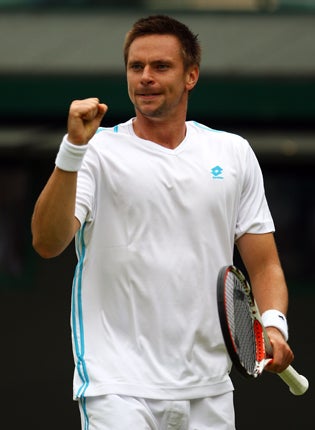Soderling again shows ability to surprise

The vacuum created by the withdrawal of Rafael Nadal remains of pretty cold comfort to those who still have to get past Roger Federer in the bottom half of the draw. In their midst, however, is a man whose recent example might invest them all with the audacity of hope.
Admittedly Robin Soderling himself proved unable to muster much resistance to Federer when they contested the final of the French Open earlier this month. But in order to meet him there the Swede first had to find feet of clay in Nadal, who was seeking his fourth consecutive success at Roland Garros.
Having never previously got past the third round in 21 previous Grand Slam appearances, Soderling then proceeded to beat three other players who could look down on him from the top 15 of the world rankings. But the way he breezed through his first-round tie here yesterday, against Gilles Müller, lent substance to the sudden transformation he seems to have achieved for his new coach, Magnus Norman.
Müller kept the first two sets close, taking the first on a tie-break, but managed to win only three games thereafter. "It was my first match since Paris, and my first [of the season] on grass, so it was a little bit tough in the beginning," Soderling acknowledged. "But after a while I managed to play better and better, and got into it well."
The distinction of being Luxembourg's premier player is perhaps not the dizziest in tennis, but Müller is a competent operator on grass and his capitulation suggests that the heavy ordnance of his serve and ground-strokes may keep Soderling involved here for a while yet.
Unfortunately for Soldering, he knows that he is likely to find "the best player in history" prowling in the fourth round – and yesterday's opening skirmishes may have disclosed a more potent threat to Federer in Jo-Wilfried Tsonga.
The Frenchman's career has been punctuated by injury, and you can see why as he rolls around the court in that broad-backed, loose-limbed way. But Tsonga is himself a Grand Slam finalist already, in Australia last year, and harnesses his power to an innate grace. Together those assets could serve him well on this surface, and his reach and ambition palpably grew during the course of an entertaining encounter with Andrei Golubev.
His opponent is a very different type, built more along the lines of a marathon runner, but showed corresponding perseverance. There was always a sense that Tsonga had more in reserve, however. He settled the first set with a serve of 136 mph and successively raised his game in tie-breaks for the third and fourth sets. His limbs seemed twice as long as previously as he contrived some electrifying court coverage.
It took Tsonga precisely 200 minutes to win 6-3, 5-7, 7-6, 7-6, but there was an unmistakable sense that the workout would be of considerable benefit. He had increasingly mixed up his tactics, but the grass foundations in serving and all-round dynamism were there for all to see. As a player who so takes the eye, and with a charming demeanour, he could become a big favourite with the crowds as his path converges with Federer's.
The first seed to fall barren was James Blake, who proved unable to build on the foundations he laid when making the final at Queen's and was beaten decisively 7-5, 6-4, 7-6 by Andreas Seppi. The American, seeded 17, was continuously stretched by his Italian rival's ground-strokes and then contrived to forfeit a 5-0 lead in the tie-break, losing seven consecutive points.
Join our commenting forum
Join thought-provoking conversations, follow other Independent readers and see their replies
Comments